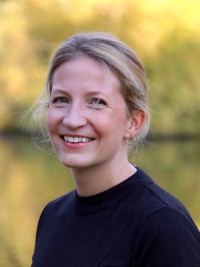Veni-grants for Rudolf Agricola fellows researchers Kira Tiedge and Kostia Gorobets
The Dutch Research Council (NWO) has awarded a Veni grant of up to €320,000 each to ten researchers of the University of Groningen and the UMCG: Ariane Gayout, Kira Tiedge, Michelle Bruijn, Kostia Gorobets, Arpan Rijal, Amaury de Vicq de Cumptich, Lars de Wildt, Merel Semeijn, Tycho Dekkers and Valerie Wiersma. The Veni grants are designed for outstanding researchers who have recently gained a PhD.
Dr, Kira Tiedge and Dr. Kostia Gorobets are fellows of the Rudolf Agricola School
NWO selects researchers based on the academic quality and the innovative character of the research proposal, the scientific and/or societal impact of the proposed project, and the quality of the researcher. The Veni grants, together with the Vidi and Vici grants, are part of the NWO Talent Programme. In total, the NWO has provided Veni funding to 174 researchers nationwide.

Designing crops for a salty future
Kira Tiedge, Faculty of Science and Engineering
Around the globe, agricultural areas are endangered by an increase of salts in the soil. This salinization reduces the yield and nutritional quality of crops grown in these areas, which poses a serious threat to our food supply. This project investigates how metabolic substances in plants can be used to increase the resistance of important crops to salinization. The results will help to develop new crop varieties that can withstand current and future climate-driven stressors to enable sustainable crop production and ensure food security.

Alternative Legalities: how the Russian invasion of Ukraine fractures international law
Kostia Gorobets, Faculty of Law
Russia justifies the invasion of Ukraine not by pointing at specific rules and treaties, but through historical examples and myths: an appeal to NATO expansion and condemnation of Western hypocrisy are accompanied by references to Russia’s sovereignty, its glorious past and the uniqueness of Russian civilization. This constructs a parallel legal reality in which rules no longer play a central role and which infringes on international law as a universal system of norms for the conduct of states. This legal philosophical research project analyzes this alternative version of international law and its imperialistic potential.
| Last modified: | 21 August 2024 12.01 p.m. |
More news
-
10 June 2024
Swarming around a skyscraper
Every two weeks, UG Makers puts the spotlight on a researcher who has created something tangible, ranging from homemade measuring equipment for academic research to small or larger products that can change our daily lives. That is how UG...
-
21 May 2024
Results of 2024 University elections
The votes have been counted and the results of the University elections are in!

